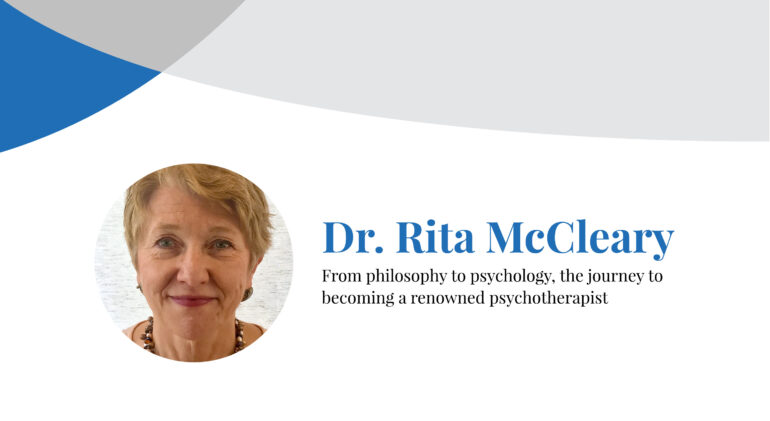If you told Rita McCleary, Psy.D., when she was young that she would be a practicing psychotherapist for nearly half a century, she may have been surprised. Although she started her career in philosophy, she later earned a Psy.D. from The Chicago School, changing her career path.
Dr. McCleary admits she was curious about psychology from a young age. Her interest in becoming a psychologist was first piqued by observing family dynamics as well as interactions with her baby sister.
Her father, an academic in philosophy, also was an influence. She followed in his footsteps, completing undergraduate studies in philosophical psychology at the University of Chicago then pursuing a Ph.D. in philosophy. She enjoyed her classes, but she hit a mental block when it was time for her dissertation.
“There were about five years of wandering in the wilderness, so to speak. I worked at a bookstore and taught philosophy classes at Indiana University,” Dr. McCleary says. “I’d been seeing a career counselor, and one day we were discussing what was next.” She returned to the idea of entering the field that had interested her so much in her youth. “I decided: I’m going to be a psychotherapist,” she says.
“The last thing I wanted was to not be able to figure out a dissertation topic again,” Dr. McCleary continues. “Plus, to get into Ph.D. psychology programs, I practically would’ve had to redo my undergraduate education in psychology, so I applied to Psy.D. programs.”
That’s when she discovered and enrolled in The Chicago School, which turned out to be a great fit. “It was multidisciplinary,” Dr. McCleary says. “I had really good teachers. I had psychoanalytic courses as well as behavioral and cognitive ones. I had one professor who taught us how to evaluate a research article to see what valid research was, what was misleading. It taught me so much and was great training for me.”
To graduate from The Chicago School, students were required to write a case study based on their work in the field. Dr. McCleary, who was doing her practicum at the Illinois State Psychiatric Institute, wrote hers about an adolescent girl with whom she had worked. Her case study, “Conversing with uncertainty: Practicing psychotherapy in a hospital setting,” explores how Dr. McCleary used various psychological theories and her philosophy training at different points in the girl’s treatment, following an initial struggle with treating her. By latching onto theoretical frameworks that she had learned during her program, like James Masterson’s treatment recommendations for borderline adolescents and projective identification, she was able to try different approaches during the treatment process and able to go beyond relying just on theory to treat this adolescent.
After graduating from The Chicago School, Dr. McCleary initially accepted a position as a clinical instructor at the Yale Psychiatric Institute before eventually leaving to start a private practice. She has worked for herself ever since. Despite her youthful interest in child psychology, her practice evolved to serve adolescents, then people of all ages. Her previous exploration of philosophy and psychoanalysis contributed to her holistic approach to psychotherapy. It’s a contrast to what she explored in her published work, where she worked through different theories in her care for the adolescent girl. As Dr. McCleary gained experience in her career, she became more confident in her clinical work, relying less on theory and more on her intuition.
“The more I have done psychotherapy, the more I trust my gut,” Dr. McCleary says. “I can still use the theories I learned, but I’m a lot more confident.” Dr. McCleary now shares her knowledge and experience as a clinical instructor at Yale and a supervisor to psychiatric residents. Her journey to private practice is a testament to how knowledge, both academic and hands on, can be instrumental in finding your calling and paving a pathway toward it.

